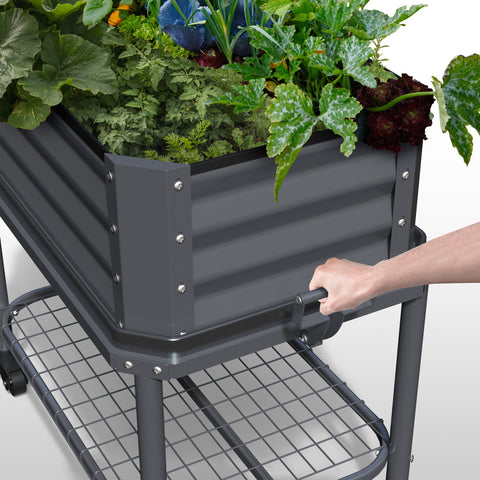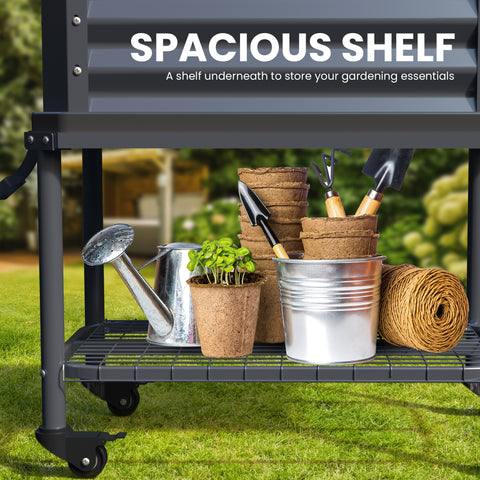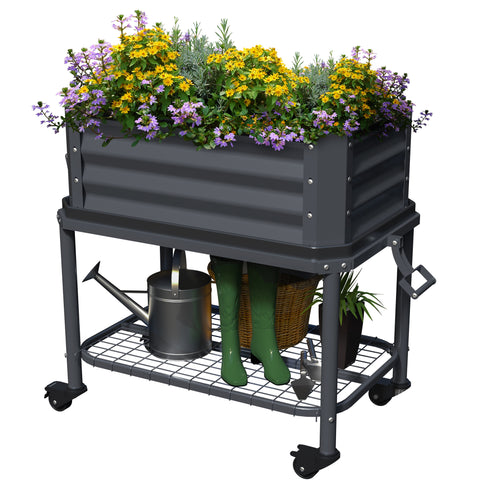Raised beds aren't the first thing people do in your vegetable garden, but as you plant, people gradually convert their garden into a bed. Just like drip irrigation, you will accept the bed as you grow, so why not design a raised garden in the first place?The following content also has some reference value for raised garden beds.
- Easy gardening operation
The raised planting bed relieves the strain on the lower back and eliminates the need to bend over the plants. If the walls are slightly below waist level, even sit on the edge to operate, harvest your bounty and better enjoy the planting process.
- Plants grow better

The soil in raised beds usually begins to warm in the spring before the surrounding soil. It also dries faster, so you can plant cool-season crops faster by simply using elevated gardens to lengthen the vegetable growing season and expand your crop choices.
- Healthy soil
If the soil is sandy or clay and the improvement process is slow, choose raised planting beds to build healthy soil faster, and fill your planting bed with compost, other organic matter, or high-quality topsoil and start gardening instead of struggling with poor topsoil. Raised beds also provide a healthier environment for beneficial microbes and earthworms, and because there is no trampling back and forth to compactthe soil, nutrient-rich soil can improve the condition of your vegetables.
- Keep your garden clean and beautiful

Spread mulch between planting beds, and no matter how wet the weather is, your feet will stay clean and you won't have to worry about compacting the soil. A series of small planting beds arranged neatly or in patterns store vegetables grown in various poses in the planting bed, which has neat aesthetic feeling and visual appeal
- Stop weed invasion
Turf grass has a spreading root system and often invades vegetable gardens as a weed. When you build raised vegetable beds, nearby divots cannot spread to your vegetable crops, ensuring a healthy and happy raised garden. Once the soil in your raised garden is exposed to the soil, cover the surface with 3-5cm of organic mulch. This reduces weeds and slows the evaporation of water from the soil.
- Stop pests

Even with raised vegetable beds, small animals such as pets or rats can mess up your vegetables, and designing and building raised vegetable gardens, at least 1m high, is one way to deter their invasion.
Disadvantages of planting beds
- Increase the cost
Planting directly on the ground, planting the beds and filling the soil, is costly and uses less durable, fragile materials that need to be repaired and replaced. It is recommended to use as low cost and durable materials as possible, and make plenty of organic compost in advance so that when the time comes to actually fill the bed, you don't need to buy extra soil.
- Faster heating and frequent watering
If your planting bed is tall, the temperature will change faster than the surrounding soil temperature will rise more in the summer, water will evaporate more quickly, water will need to be watered more frequently, and organic mulch will be added to retain water.
- Large space footprint: Garden bed planting requires a certain amount of space, if insufficient space may affect the surrounding environment and activities.
4.High maintenance difficulty: garden bed planting needs frequent management and maintenance, such as watering, fertilizing, weeding, etc., which needs to spend more time and energy.
- Great environmental impact: garden bed planting is vulnerable to environmental impacts, such as climate change, natural disasters, etc., and corresponding preventive measures are needed.
Garden bed planting is a more advanced and sustainable planting method compared with traditional planting methods. Its advantages are strong controllability, reduce pests and diseases, convenient management, increase beauty and so on, but the disadvantage is that the cost is high, space occupation, maintenance difficulty is high, affected by the environment and so on. Garden bed planting can create a unique, beautiful and healthy garden space if done well in site selection, design, planting and management.









